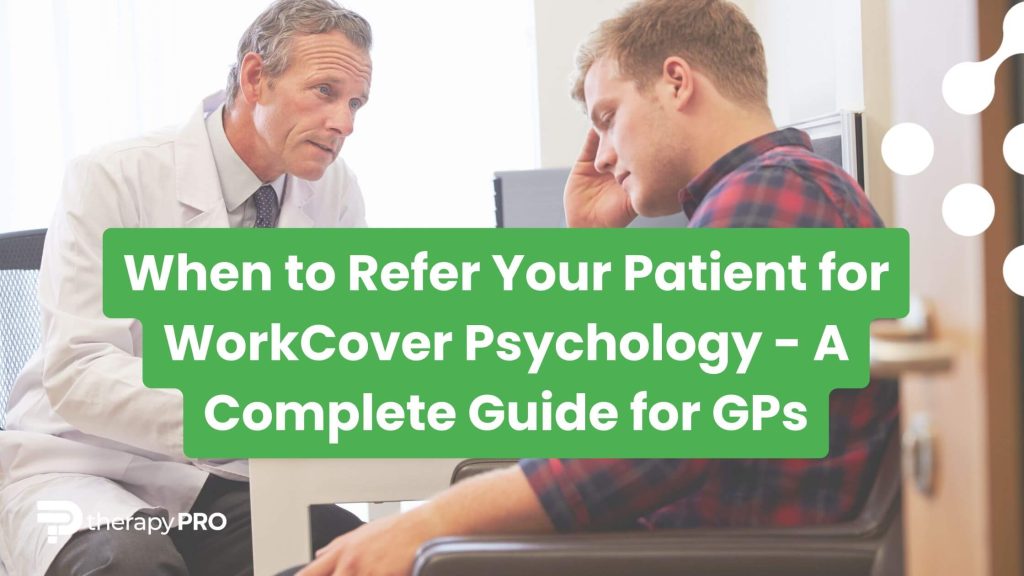When to Refer Your Patient for WorkCover Psychology
A Complete Guide for GPs
As a GP managing patients with workplace injuries, you’ve likely encountered cases where physical recovery does not progress as you anticipated, or stalls unexpectedly.
The X-rays look good, the injury is healing, yet your patient remains anxious about returning to work or reports pain that seems disproportionate to their injury. These scenarios can signal that psychological factors have emerged and knowing when to refer for WorkCover psychology is helpful.
Physical injuries don’t occur in isolation from mental health factors. The distress of an accident, fear of re-injury, financial worries, and concerns about job security can all weave together to create a complex recovery landscape. When unhelpful psychological factors aren’t addressed early, they can maintain disability long after physical healing has concluded.
Recognising when WorkCover psychology support may be needed
The signs that your patient might benefit from WorkCover psychology often emerge gradually. Key indicators include:
Mood and behavioural changes: They may seem more anxious during consultations, expressing excessive worry about their prognosis or making catastrophic statements like “I’ll never be the same again” or “My career is over.” They might become reluctant to engage with their physiotherapist, occupational therapist, or withdraw socially from work colleagues and family.
Physical symptoms exceeding injury severity: Pain that seems disproportionate to the physical injury, or functional limitations that don’t align with clinical findings. Patients may become hypervigilant about symptoms, interpreting normal healing processes as signs of worsening injury.
Persistent stress responses: Sleep disturbances, appetite changes, and irritability that persist beyond the first few weeks following injury or intensify over time. While these responses are normal initially, prolonged symptoms may warrant attention.
The key is recognising when normal stress responses to injury become problematic patterns that impede recovery.
Understanding WorkCover psychology requirements
WorkCover psychology operates within a specific framework that differs from general mental health services. The treatment must be clinically justified, directly related to the workplace injury, and focused on functional outcomes rather than general wellbeing.
Your referral needs to clearly establish the connection between your patient’s psychological symptoms and their workplace injury, demonstrating how these symptoms are impacting their recovery and return-to-work capacity.
WorkCover-approved psychologists understand these requirements and work within a collaborative care framework, providing regular progress reports and coordinating with other treating practitioners.
An efficient and effective referral process
Creating an effective WorkCover psychology referral involves:
- Assessment: Consider using brief screening tools like the DASS21 or K10. Document sleep disturbances, appetite changes, or behavioural changes you’ve observed or have had reported.
- Documentation: Paint a clear picture of how psychological factors are impacting recovery. Describe specific examples of avoidance behaviours, catastrophic thinking, or functional limitations that seem disproportionate to the physical injury.
- Provider selection: Look for practitioners who specialise in psychology support after workplace injury and have experience with your patient’s type of injury or work environment. Consider practical factors like location and appointment availability.
When psychology referral isn’t appropriate
Not every patient with a workplace injury needs psychology support. If your patient is coping well, engaging actively with their treatment plan, and showing steady progress toward return-to-work goals, a psychology referral may be unnecessary.
Alternative pathways may be more appropriate when patients have pre-existing mental health conditions that clearly predate their workplace injury or require psychiatric intervention for severe mental illness.
The key is distinguishing between appropriate adjustment reactions to injury and problematic psychological responses that are likely to impede recovery.
When in doubt, a brief consultation with a WorkCover psychologist can help determine whether formal treatment is warranted.
Addressing patient concerns
Many patients may initially resist psychology referrals due to stigma. Address this by:
- Framing WorkCover psychology as specialised support that helps people recover more completely from workplace injuries, not treatment for mental illness
- Emphasising that psychological factors are a normal part of injury recovery
- Explaining that WorkCover psychology is confidential and work-focused
- Clarifying that accessing psychology support demonstrates active recovery efforts and typically strengthens rather than weakens their claim position
The evidence and benefits of early treatment
Research suggests that early psychological intervention if indicated may lead to improved outcomes for some patients.
Psychological Response To Injury: Research to support workers’ psychological responses to injury and successful return to work shows that GPs initiating psychological referrals align with best-practice return-to-work strategies and can reduce the risk of delayed recovery.
Workers who receive comprehensive support that addresses both physical and psychological aspects of recovery typically report better pain management, improved functional capacity, and higher confidence in returning to work.
Comprehensive care after workplace injury
A WorkCover psychology referral is about providing comprehensive care that addresses all aspects of injury recovery.
By recognising psychological barriers early and connecting patients with appropriate support, you’re preventing the development of chronic conditions that can affect long-term health, work capacity, and quality of life.
Our blog on when WorkCover psychology support can help return- to-work outcomes focuses on reducing manufacturing injury costs and would be relevant for any manufacturing patients.
When you notice signs that psychological factors are complicating your patient’s recovery, don’t hesitate to make a WorkCover psychology referral.
If you’re ready to refer, simply complete our referral form here.
About our Therapy Pro psychology team
This article was developed by Therapy Pro’s team of registered psychologists and mental health professionals.
With experience offering NDIS psychology supports to participants, helping clients across Australia with WorkCover services, Assessments and reports, and servicing MHCPs, our team provides evidence-based psychological interventions tailored to individual needs.
We are committed to delivering high-quality, person-centred care through in-person and online services. All interventions are delivered by AHPRA-registered psychologists working under nationally recognised ethical guidelines.
++++
Important notice: This information is general in nature and is not intended as personal advice. Individual responses to therapy vary. We recommend consulting with a qualified mental health professional to discuss your specific circumstances and determine the most appropriate treatment approach for your needs.




